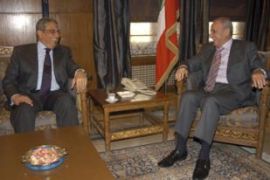Amr Moussa begins Lebanon mission
Arab League chief meets senior opposition politician in fresh push for compromise.

“We come full of optimism, full of hope. The initiative is clear and we will start work now because time is tight.”
Lebanon has been without a president since the term of Emile Lahoud ended on November 23.
No agreement
The Lebanese parliamentary majority and the Hezbollah-led opposition have been unable to agree on a deal to elect a successor, though both have backed General Michel Suleiman, the army chief, to fill the post.
Arab governments endorsed Suleiman’s nomination on Sunday and advocated a national unity cabinet in which he would hold the balance between the majority and the opposition.
Saudi Arabia, which backs the majority, and Syria, a strong supporter of the opposition, have both agreed to the plan which came after a French-led mediation effort failed.
Rapprochement
Moussa indicated that the plan, which came after a meeting attended by the foreign ministers of Syria and Saudi Arabia, had opened a window in the deadlocked Saudi-Syrian ties.
“This rapprochement or opening of doors or at least windows hopefully will be very influential,” he said after talks with Berri.
Berri, who is also an opposition leader, has called a parliamentary session for Saturday in a 12th attempt to elect a president, but another postponement is inevitable unless a surprise deal emerges during Moussa’s talks.
Both Lebanese camps welcomed the plan, but offered different interpretations on the shape of the new government.
Seat distribution
The opposition says implementing the plan would distribute seats in the new cabinet equally between it, the president and the majority – thus each side would get 10 ministers in a 30-member government.
The ruling coalition says the plan guarantees it more seats than the opposition which is also deprived of veto power – meaning the majority would have 14 seats, the opposition 10 and Suleiman six ministers.
Parliament elects Lebanon‘s president with a quorum of two-thirds, something neither camp hold.